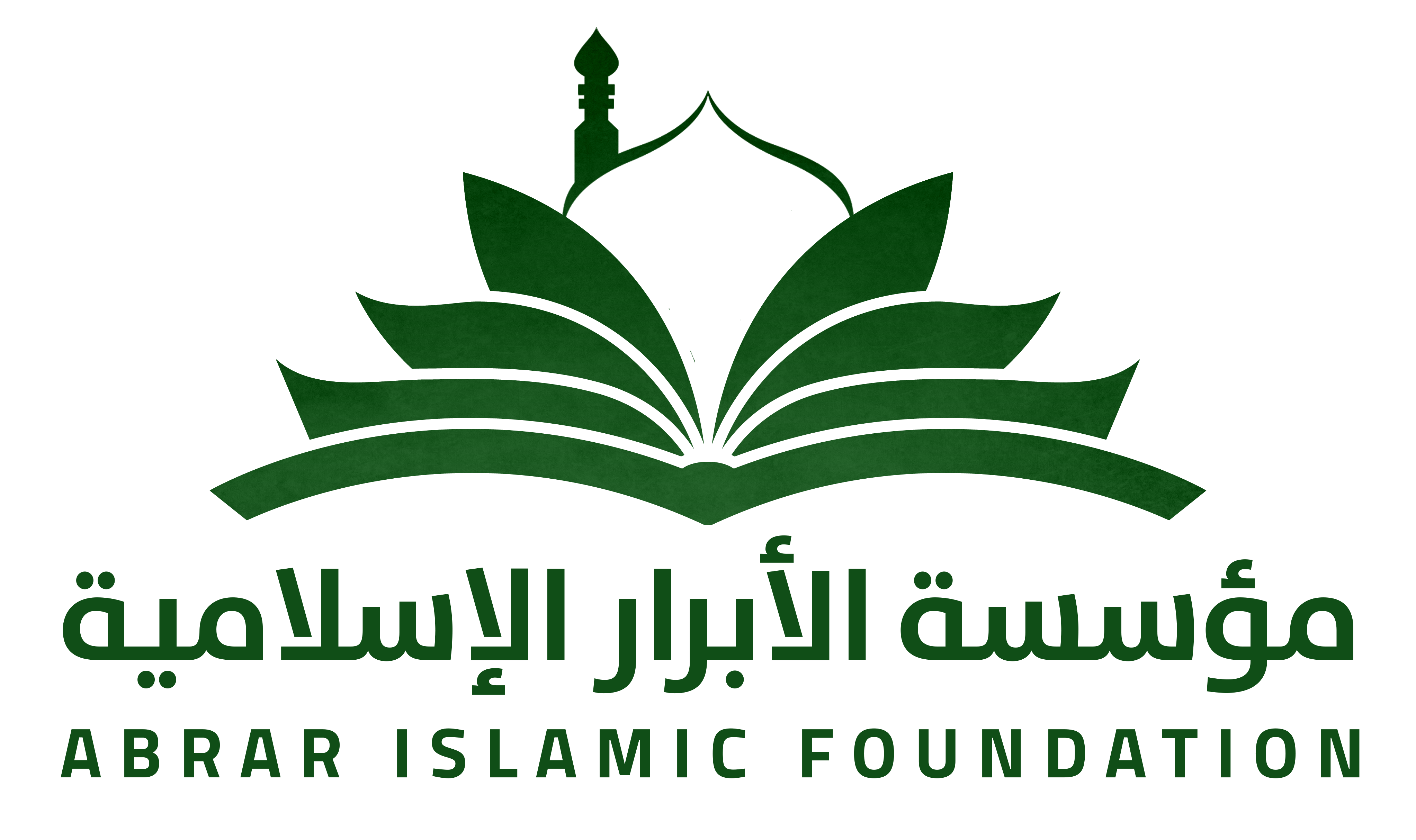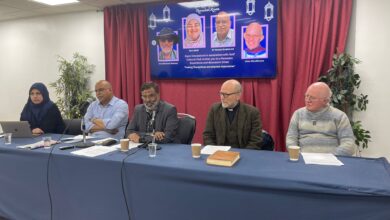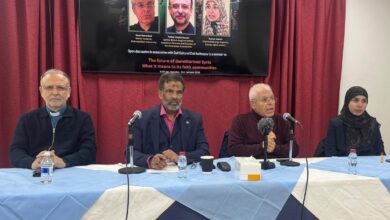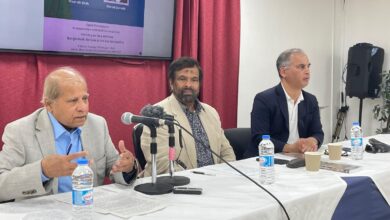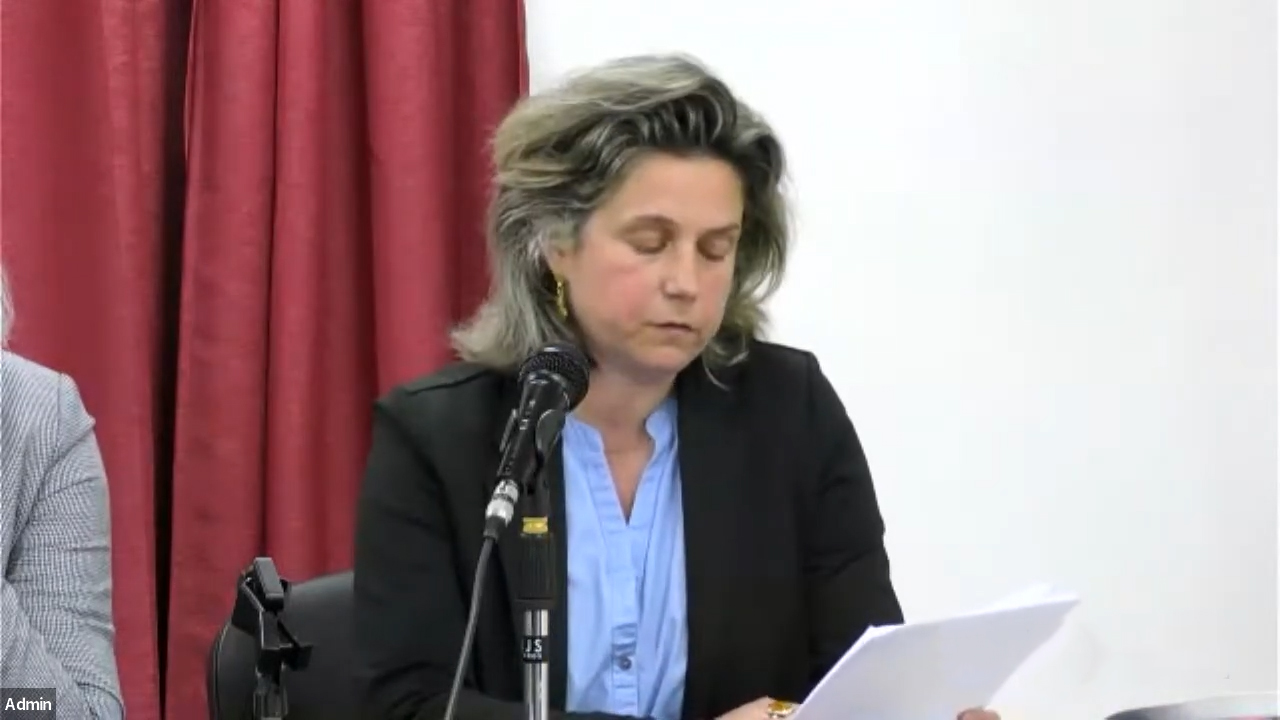
Sudan: From disintegration to obliteration
The recent flare-up of military confrontation among senior military leaders ruling Sudan is an indication that the military rule is not sustainable. Hundreds were killed unnecessarily as senior figures of the military junta vied to extend personal authority. The people of the country which had witnessed its biggest loss when its southern part was grabbed by the secessionists are politically and morally exhausted. They had struggled against foreign invaders in order to gain real freedom and revolted against the personal rule of Nimeiri to achieve the democratic transformation to modern statehood. Their hopes were repeatedly dashed. With the ongoing strife by the military, the people, once again, aspire to return to civilian rule under a democratic and constitutional framework.
The future of Sudan and its citizens is at stake.
Ammar Hamoda: We thank Open Discussions and the Gulf Cultural Club for organising this event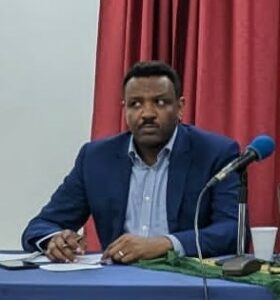 about Sudan and the war and the very bad situation in Sudan. I will talk about the political side and I will leave the humanitarian side to my colleague Othaylat.
about Sudan and the war and the very bad situation in Sudan. I will talk about the political side and I will leave the humanitarian side to my colleague Othaylat.
I would like to talk about the root cause of this conflict in Sudan right now. I would like to think that the well-described term for this war is the two generals’ war. It is the tale of two generals. This situation was inherited from the previous regime. It is a contradiction and a mixture of many things together. We can understand that you divide and conquer using the political parties but having a paramilitary power that is well equipped with weapons more advanced than the ones in your official army is something very dangerous and definitely it will lead to a clash somewhere.
So the paramilitary rapid support forces were designed to be a counter to the rebellion in Darfur so that they could do what the official army could not do. And after that, they developed to be a personal defense for Al Bashir.
Since day one we as politicians have understood well that this situation cannot go further unless we have well-organised steps to make a unified professional and national army. This is very crucial. We could slip into a civil war. We are now very close to a civil war. We do not want to go that way and we hope it will go that way.
In our opinion from day one after the revolution after putting away Omar Al Bashir we came to a kind of power-sharing between the civil front and the military front. We expect we will have some division in the civil front to be away from the political course in that transitional period but we said okay we can go through this with a unified front. The same people who led the revolution can go and survive and reach a general election. But the fractions began to start just after having the first government. After a while, we lost touch and the civil front is not a unified front and we have to find solutions.
This led to a military coup in 2021 on 25th October by Al – Burhan because it was time for him to transfer power to the civilians but he decided to go for a military coup. This is very dangerous while we are in a transitional period. We have had many military coups.
We have found something very strange. The military side itself is not unified and the civilians are trying to avoid getting into this kind of war they succeeded many times not to go into war but the last one happened. Of course, we will not be able to avoid these kinds of clashes all the time because we have many armies. Some of these forces came after the Juba Agreement and they also have weapons. You could count three four or five kinds of armies and the challenge is to unify them and put them together in one army.
Here came many things. We have of course internal factors and external factors as well. The internal factors for you as outsiders seeing the international factors are very clear. We should admit that the ambition of these two generals is very high and every one of them is trying to get the power, all the power.
Although these two generals have a very long history together – they should decide who should be number one. And everyone is depending on his military side. And now they are practising politics. When you practise politics all rules about the military side should be taken away. They brought the power of weapons into the political clashes and the reason is that now they are fighting in Khartoum.
One of them is trying to be in the streets in many civilian buildings. This is the RSF and the other one is trying to target those people using the fighters. When I say fighters please do not go for smart weapons. It is an old-fashioned war with bombs that will kill everyone and they are not so precise. So they are not considering civilians as people who should be taken into consideration.
The military side now is very fragile and everyone is saying they are taking control of very wide land or the most important places. So even the truce is the big thing in this war and I think the media is making it with flavours. Some people are supporting this side and other people are supporting the other side.
You can see the freedom in social media with no referencing news and fake news and lots of news. Sometimes you call your mum and the people who fled into the rural areas you find either they don’t know anything about what is going on or they are convinced of fake information or disinformation. It is more complicated and very difficult to distinguish what is happening on the ground. Lots of reports contradict one another. So there is a lot of processing for you to do. You have no genuine source of information till now.
The other thing about the civilian role is that now we are in the war. We cannot express our political will in any way peacefully because guns now have the upper sounds. Protesting or expressing your opinion in this way will put many civilians under a great threat of being killed. We have areas to work on like the diplomatic and the media. We could encourage them to defuse the war and to stop the war. This is very simple.
Sudanese outside the country are very enthusiastic about the war itself and they are encouraging people to fight more and more. This is crazy. We fight to the last drop of our blood. This is something unbelievable. All our very long civil wars ended in a dialogue in a peaceful way. Even the longest one Sudan and South Sudan ended through negotiations. There were many civilian and military casualties.
Another point about the political situation in Sudan is about expectations and reality. After the successful overthrow of Omar Al Bashir people tended to have very high expectations. During this transitional period, we can actualize all our goals and all our wishes. And when you find yourself you should make it doable. There is a very big gap between these expectations and reality.
So here came the role of politicians, of analytical thinking of think tanks of politicians and many players to play a role of narrowing this gap with some efforts that we can reach or we can have a situation where we enjoy having some of our goals. But the gap itself is stretched between those who are talking about the revolutionary authority or taking people through the actions of revolution and if we have this victory through military action.
Other people are saying your society, your structure is very fragile. You have to be very careful when you do something that could destroy this very weak structure. This is very tough to balance. Considering that you inherited very weak institutions. The fact that the regime through 50 years of governance are building a parallel structure where they are managing the country through this parallel structure and our government structure was very fragile and very weak and sometimes I can tell people on the technical side in government institutions have no idea how to change the password for their computers. There will only be one computer in that place and no one is caring about that. This was the past.
What can people do for Sudan to see a better future? It is very bleak now but our idea is to find solutions to take care of the future rather than just the past. I don’t want to talk about the humanitarian side because I left it for my colleague Othaylat but for the political side. Now we are talking about the civilian front. We are civilians. We have no weapons other than being peaceful and being organised.
So not to go for a political dictatorship or a civil war we should organise ourselves on a civil front this is now not in its final shape but it is evolving and we can say that if we have very good will to do for that aim or goal we can do it but we need first to stop the guns. The normal, natural way of life is to talk and we cannot talk about any political solution right now.
Another thing about the political talks in Jeddah right now between the two generals, the two sides are going on. We have to find a political process for a solution. We think it is credible negotiations but we ask for acceleration. The war is very tough on the people on the ground. Every day that we continue the war we lose Sudanese people and shed Sudanese blood.
We also have regional and international factors but the effect of the internal players is the most crucial factor. This slipping into war is not due to external reasons. This is not the reality. The reality is that the ambition of having all the power in one hand is real. I think this could be a step in stopping the war because you cannot make a final decision unless you kill most of the civilians. This is a very high price. I don’t think it is imaginable.
Othaylat Suliman: I would like to give some background. The Sudanese were going about their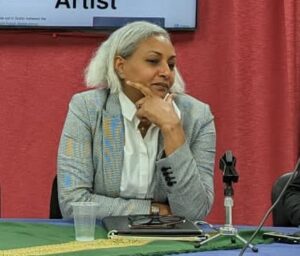 business during the last ten days of Ramadan, a spiritual time and it was a sunny day in London when we started hearing reports about fighting breaking out and a crisis. It became evident that it was a conflict between the army and the Rapid Support Forces. What followed of course as you have been following the news has been just days of bombing, shelling, looting, and lawlessness.
business during the last ten days of Ramadan, a spiritual time and it was a sunny day in London when we started hearing reports about fighting breaking out and a crisis. It became evident that it was a conflict between the army and the Rapid Support Forces. What followed of course as you have been following the news has been just days of bombing, shelling, looting, and lawlessness.
We need to step back and see what got us to this point. Amar will speak about the political side of things and I just wanted to clarify the two main actors the army and RSP. This has been portrayed as two generals. How did the militia come to the capital? How is it that after four weeks the army has not been able to take control of the vital strategic location?
The RSF started off as a militia in Darfur and were sometimes with the government and sometimes against the government, sometimes with the Chadian opposition, and sometimes with the Chadian government until Bashir made a formal agreement for them to carry on the war in Darfur on behalf of the armed forces and consequently to become the border patrol between Sudan and Chad. This was the legal agreement. This was in 2003.
By 2023 ten years later the RSF was given an official title they became the Rapid Support Forces and they were part of the government. They were also responsible for suppressing the first uprising by civilians.
So they were taking a role already in maintaining law and order. Under Bashir, a law was passed in parliament officially giving them a role. By 2019 the position of the RSF was strong. People were not sure whose side the leader was on. He told the people he was with them but the sit-down massacre was carried out by RSF forces.
Post that during the transitional military council, Hemdi was a member of the five members who were representing the armed forces. What happened from 2019 till now is that they were increasing their power. One of the reasons for this is that they were actually paid by the federal government. Also in the war in Yemen, they were mercenaries. This was a source of income.
The third source of income is gold smuggling and we have a global witness report which shows this. So under the European Anti Immigration Progamme known as the Haskim process, they were given the role of border patrolling.
So we go from 2003 when they are just a border patrol until now when they are part and parcel of the military complex. And I think four weeks on that the military is not able to fight them is because they are in strategic positions in the capital but also because they have effectively been taking the role of ground troops. The Sudanese army does not have ground troops. The only thing they have is the airforce. So basically the attempt to dislodge them by bombing the city is not going to be effective. The people who want the war to continue are taking the line of bombing the cities so far and four weeks on has not given any results.
What has been happening in the army since Bashir’s coup a large number of the professionals were laid off. The recruiting of young people was based on party allegiance. The main party was the National Congress Party. The army takes 80 percent of the budget yet it is obviously very badly prepared for a ground war. So the character of the army, and the makeup of the army itself has changed.
I am mentioning this now because the debate now prevalent among the Sudanese is which side to support. I think actually the question begs the point. They are both the same. But more important is that the element of the civilian component who were very strong in their will and fighting for democracy has not been supported by the international community. They have been left out of the equation.
The humanitarian situation is pretty bad because all the infrastructure has been hit. All the good supplies have been squandered. They have been looted, they have been burned. So who is left on the ground is the neighbourhood committees who are doing the work of trying to rescue people, taking them to the hospital, and bringing them essential supplies. There is no government.
You have the army attacking, you have the RSF counter-attacking. The focus of the media has been on evacuation. These are the lucky ones. For a lot of people, they cannot escape. They do not have the means to escape.
The other impact of the war is that 70 percent of the hospitals have been bombed because the RSF are stationing themselves in hospitals and as there are no ground troops the only way to get rid of them is by bombing.
So we have a serious situation vis a vis lack of medicine and lack of medical care. Of the nine million population in Khartoum three-quarters of them rely on derisory income. That is the tea ladies, the people who sell the traditional bread on the roadside. The people who work in the internal transport system – the bus drivers. All of these people rely on their daily income and given that the situation was pretty bad already people do not have resources. They do not have savings to live on.
So for four weeks you have people who have been out of work, have no social income and the humanitarian assistance has been slow. It has taken them three weeks to reach Port Sudan. It is a 12-hour drive. But without a ceasefire and without humanitarian corridors nothing can be done.
Sudanese local initiatives can be accessed through the following links:
https://forms.gle/6Pup9j4kyoshEkDe6
https://sudancrisis.org/home
https://m.facebook.com/story.php?story_fbid=pfbid02i67QZQLLcVzgDg6A6GtsqJSbsDAU2s8cYnUs24K8QFavut6UGFhX3TX2L8rU7XEol&id=100069020534330
Frederique Cifuentes: Hello everyone, my name is Frederique Cifuentes-Morgan, I am a photographer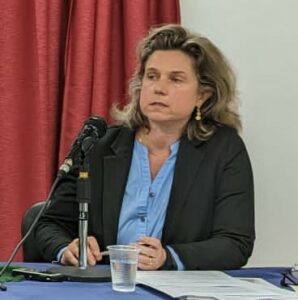 and documentary filmmaker based in London. I would like to thank the Gulf Cultural Club and Abrar House for inviting me tonight.
and documentary filmmaker based in London. I would like to thank the Gulf Cultural Club and Abrar House for inviting me tonight.
I would like to start with the screening of This is US… This is SUDAN
directed by Mohamed Kordofani.
This is an introductory film about Sudan’s diverse resources and cultures filmed in over 50 locations all over Sudan. This film was first screened at the Paris Conference to support the transition into democracy.
In the wake of the armed conflict which began on 15 April 2023 in Sudan between the opposing forces of Sudan’s army chief, Abdel Fattah al-Burhan, and Mohamed Hamdan Daglo, the commander of the paramilitary Rapid Support Forces (RSF), hundreds of Sudanese have been killed and thousands wounded.
Armed conflict affects many aspects of life. As well as the humanitarian toll it takes, conflicts often involve damage to and the destruction of cultural heritage as well as the looting of artifacts. This presentation looks at how the current conflict in Sudan is affecting heritage and culture and the challenges to the promotion and development of heritage and culture in the future.
I am going to take you on a very personal journey, as Sudan and South Sudan have been at the center of my work for the last 20 years. I have produced many films, photo stories, and cultural projects on the Sudanese and South Sudanese society and I have been extremely fortunate to meet amazing religious leaders, artists, authors, academics, journalists, publishers, critics, activists, and wonderful individuals from both countries. Tonight I would like to honour the many friends and talents that I have met. I am going to share with you a number of beautiful and much cherished moments through photography and films.
Before showing you some clips and slide shows, I would like to talk about the initiative
‘SPONSOR A SUDANESE ARTIST’ (https://sponsorasudaneseartist.wordpress.com/
which is led by a group of curators and gallery directors who have created a gofundme page. As the conflict in Sudan enters its fourth week, artists like many others in the capital find themselves trapped and unable to carry out their work, as bombs and bullets rain down on the city. Khartoum 2, once a lively hub for artists, turned into a battleground for rival militias. A much-needed initiative to support artists through these difficult times.
The area of Downtown Khartoum and Khartoum 2, which are known to be the artistic neighborhood of the capital, has been heavily destroyed by airstrikes and shootings. Numerous artists spent the first few days of the war being trapped in those incredibly dangerous places, which used to be full of art galleries and music, and painting studios. As most of them have been able to reach relatively safer areas, they are now faced with the following issue: the complete lack of possibility to make any money. Even if they could access their art spaces and produce, who can afford to buy? Numerous artists used their art as the main source of revenue for their families.
I would also like to highlight the project www.sudanmemory.org, which is going to organise a special event in Sudan at the end of May in London. Here is an email I received from Dr. Katherine Ashley, one of Sudan Memory’s project managers:
‘In light of the events in Sudan, we/Sudan Memory group feel that it is important that as well as concern for the humanitarian catastrophe that is unfolding, we also need to think about what the effect of the present crisis is on culture. It is because of fears of conflict like the present one erupting that the Sudan Memory project tried to save as much cultural content as we could through digitisation. This seems like a very good time to promote the work of the project as much as possible, and to make plans to continue – when the time is right – to try to save more materials and stories and to digitally recirculate Sudanese cultural heritage, especially to Sudanese communities across Sudan and the diaspora.
As a way of continuing our work at this time of renewed crisis, we are therefore planning an event on Tuesday, May 30 (17.30 – 19.30) at Bush House, Sudan Memory, Sudanese Futures, and are inviting representatives of diaspora organisations, as well as journalists, artists, writers, cultural and NGO practitioners, to explore with a panel of speakers and a general audience how the work we are doing at King’s might support the ongoing cultural, educational and advocacy-based work of UK-based Sudanese communities and organisations, and provide a platform from which to contest the violence in Sudan. This is being hosted by the Kings College London newly-formed Global Cultures Institute which brings together a range of academics and institutions in order to explore how we can understand and value our diversity and differences.
Further to the 17.30-19.30 event, there is an earlier panel on the same day (location at King’s College tbc) 15.00-16.00’.
Now I am going to show you some of my own work and I will talk about The Sufi way in Sudan www.fredcifuentes.com
This project is based on photographic research carried out mainly in Khartoum and its surrounding region, Jazira State and Sennar State, and the Red Sea State. It relies on a five-year photojournalistic journey into Sudan covering Sufi brotherhoods from inside the Burhaniya, Qâdiriyya, Sammâniyya, Mîghaniyya, Khatmiyya, and Tijaniya religious communities. The project focuses in particular on encounters with a nation of mystics. This experience in Sudan shows through pictures the relation between Sudanese society as a whole and the enriching aspects of these Sufi groups.
A total immersion within various Sufi brotherhoods allowed me to participate in their daily practice and to consider the role played by their founding saint and the direct successors, and, always carry out my photographic work with the permission of the local sheik.
Sufis are followers of universal thinking descended from Islam and which has overtaken the differences among men. From this comes a certain form of tolerance with respect to «each other» which is noticed throughout the journey. Sufism in Sudan is part of the country‘s cultural basis and it has become «a way of life». Most Muslim families belong to a Sufi group, beginning, say, with the father, and then the rest of the family gets involved more or less deeply.
Following certain rituals it is possible to integrate with a brotherhood and to follow the teachings of the sheikh. Different types of initiation ceremonies exist, which according to tradition should be carried out following a journey of initiation, also known as wandering (Khalva); or again, for example, nowadays the Burhani more simply employ a prayer of initiation.
It is surprising to travel to Sudan and discover a multitude of Sufi brotherhoods with diverse origins and characteristics. Some groups were formed as far back as the 15th century by Sufi masters originating from Iraq, Morocco, Tunisia, and Egypt by way of Nubia or the Red Sea. Each wave of Islamic migration left diverse Sufi groups implanted across the country. The tribal structures (numbering more than 600 tribes) of the country have largely influenced the brotherhoods, and have given their own character to each group. Sudan is a mosaic of ethnic groups shared among the majority Islamic and Sufi population, and Christian and animist minorities. Out of this comes a cultural wealth which remains to be explored.
*Ammar Hamoda is a Sudanese politician and a leading official within the Unionist Alliance of Sudan. He is one of the official spokespersons of Forces of Freedom and Change FFC (Sudan). He is a freelance ICT professional (Technical/Commercial). Born in Sudan, he studied at Khartoum University and holds MBA from the Brunel University in Aviation Management.
**Frédérique Cifuentes is a multimedia producer, curator and educator based in London, specialising in the documentation and promotion of cultural identity and heritage. Her work is deeply informed and enriched by continuous multicultural experiences, cross-cultural dia¬logues and exploration of identities, histories and mea¬nings. Over years of research and work in Sudan and the UK, Frederique has built a significant archive of Sudan heritage through photography and film, spanning various locations and themes.
***Othaylat Suliman is a free-lance journalist and media consultant. She has an MA in Middle East Politics from University of Exeter, and an undergraduate degree from the American University in Cairo (AUC). She started her professional career as a print journalist working for Egypt’s Al Ahram Weekly, before moving on to broadcast journalism. With a career spanning more than twenty years, she has worked for various television news organisations including APTN, Middle East Broadcasting Centre (MBC) in London and Dubai, and Alaraby TV. She was a former Al Arabiya Channel Sudan bureau manager from 2008-2013.
